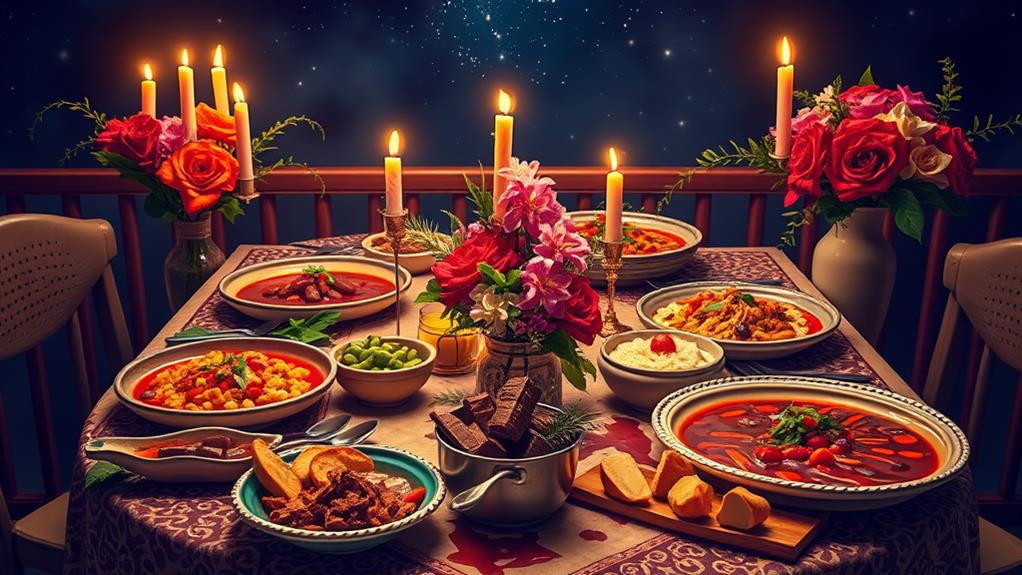In *Like Water for Chocolate*, you'll find a enthralling blend of love, tradition, and magical realism. Tita, the protagonist, navigates family duty and unfulfilled desire, using cooking as her emotional outlet. Each chapter begins with a recipe that beautifully ties into the story, creating a feast for the senses. This novel explores complex relationships, particularly Tita's struggle against her mother's oppressive control. The interplay of food and emotion resonates deeply, reflecting broader cultural themes. If you're curious about the impact of culinary artistry on Tita's journey and what it symbolizes, keep going to uncover more layers of this enchanting tale.
Overview of the Novel
"Like Water for Chocolate" is a poignant novel that captures the essence of family duty and unfulfilled love against the backdrop of Mexican tradition. The story revolves around Tita, the youngest daughter of the De La Garza family, who faces the harsh reality of being bound by family tradition. She's forbidden to marry her true love, Pedro, because she must care for her domineering mother, Mama Elena.
This love story unfolds amid the emotional events of the Mexican Revolution, where societal expectations weigh heavily on personal desires. Tita's journey symbolizes female empowerment and self-expression, as she navigates the oppressive constraints of her family and society.
Through a unique blend of magical realism, Esquivel masterfully intertwines Tita's culinary skills with her emotions. Each chapter begins with a traditional Mexican recipe that serves as a metaphor for Tita's feelings and experiences. The food she prepares becomes a powerful symbol, connecting her to her family and the wider world while highlighting her struggles.
As you journey through Tita's life, you'll witness the profound impact of unfulfilled love and the sacrifices she makes for her family.
"Like Water for Chocolate" not only tells an enthralling story but also immerses you in the rich tapestry of Mexican culture and tradition.
Main Characters
In "Like Water for Chocolate," you witness Tita's emotional journey as she battles family expectations while trying to express her love for Pedro. This struggle mirrors the resilience seen in immigrant experiences, where personal desires often clash with societal pressures, as highlighted in the struggles faced by immigrant communities.
Pedro's complicated choices put him in a tough position, marrying Tita's sister Rosaura to stay close to her.
Meanwhile, Mama Elena's dominance looms over Tita, enforcing traditions that stifle her desires and dreams.
Tita's Emotional Journey
How does Tita's emotional journey reflect the struggles of self-identity and familial duty? Tita, the youngest daughter of the De La Garza family, finds herself trapped between her love for Pedro and the oppressive traditions dictated by Mama Elena. Forbidden from marrying the man she loves, Tita channels her longing and despair into cooking, where her emotions manifest in magical ways. Each dish she prepares carries her heartache, igniting passion or evoking sorrow in those who taste it. This unique connection between her emotional state and her culinary talents reveals her struggle for autonomy amid familial obligations.
As Tita grapples with her identity, her conflicts with Mama Elena and her sister Rosaura deepen her desire for self-expression. She battles against the weight of family traditions that bind her, yearning for a life defined by her own choices.
Ultimately, Tita's journey culminates in a poignant reunion with Pedro, showcasing how love can transcend the constraints of duty and tragedy. Through her emotional journey, you witness Tita's transformation, illustrating the complexities of love, family, and the fight for one's true self.
Pedro's Complicated Choices
While Tita's emotional journey unfolds with passion and heartache, Pedro's complicated choices add layers to the narrative's tension. He finds himself ensnared in a love triangle, marrying Tita's sister, Rosaura, to stay close to Tita while adhering to familial tradition. This decision creates a profound emotional conflict, as Pedro's heart belongs to Tita, yet he sacrifices his true desires to fulfill societal expectations.
Throughout the story, Pedro's character evokes mixed feelings; some perceive him as weak and selfish for not breaking free from tradition. However, his actions reflect a deeper theme of unfulfilled love. You witness his struggle as he continually seeks a connection with Tita, even within the confines of a loveless marriage.
These choices lead to a series of tragedies, showcasing the pain of longing and the complexities of love. Ultimately, Pedro's journey culminates in a poignant reunion with Tita, emphasizing the sacrifices made in pursuit of love. His complicated choices drive the narrative forward, revealing the intricate dance between desire, duty, and the heart's true calling.
Mama Elena's Dominance
Mama Elena's dominance looms large over the De La Garza family, shaping the lives of her daughters with an iron grip. Her authoritarian control is particularly evident in her relationship with Tita, where family tradition and societal expectations clash violently with Tita's desire for autonomy.
You can almost feel the weight of Mama Elena's oppressive presence through:
- Her cold, piercing gaze that silences any dissent.
- The suffocating atmosphere during family meals, where joy is replaced by tension.
- The heavy burden of duty that Tita carries, chained by tradition.
- The emotional distance that breeds resentment and unfulfilled dreams.
Mama Elena embodies the struggles faced by women in a patriarchal society, manipulating her daughters to uphold her rigid values. This creates a significant source of conflict, as Tita yearns for love and independence but finds herself trapped in a cycle of obedience.
Mama Elena's harshness and emotional distance serve as constant reminders of the oppressive familial duty imposed on her, highlighting the desperate need for female autonomy in a world steeped in traditional gender roles.
In the end, Mama Elena's dominance becomes a powerful symbol of the struggle against societal constraints.
Themes and Motifs
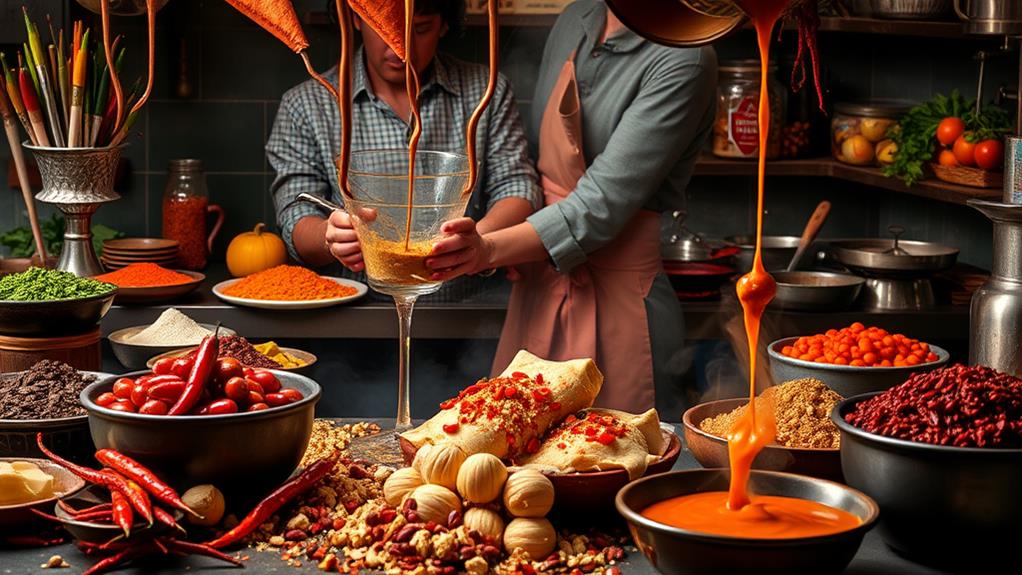
In "Like Water for Chocolate," food isn't just sustenance; it's a powerful expression of emotion that connects Tita to those around her.
This theme of emotional connection through food mirrors the resilience and strength found in stories of survival shared by women overcoming adversity.
You see how her culinary creations reflect her inner turmoil and desires, highlighting the tension between familial duty and personal longing.
This struggle resonates throughout the story, making you question the balance between tradition and the pursuit of happiness.
Food as Emotion
Tita's kitchen becomes a canvas for her emotions, where every ingredient and recipe reflects her inner turmoil and desires. In "Like Water for Chocolate," food serves as a powerful medium that intertwines with Tita's experiences, illustrating the profound connection between cooking and emotion.
Through her culinary creations, Tita expresses feelings that societal expectations often suppress. Each dish she prepares evokes powerful reactions, showcasing the magical realism woven throughout the narrative.
Consider the imagery of:
- Melted chocolate swirling like Tita's longing heart.
- Chilies igniting passion, causing lovers to embrace fervently.
- Baking bread that rises with hope, yet falls with despair.
- A simmering pot of soup, releasing memories that haunt family gatherings.
These moments reflect Tita's struggle to convey her desire amid the constraints of tradition and family duty. Her recipes aren't just sustenance; they're vessels of emotion, bridging the gap between her inner world and those she loves.
Tita's cooking illustrates how food can transcend the physical domain, creating connections that linger long after the last bite is taken. In this way, "Like Water for Chocolate" beautifully reveals food as a profound expression of emotion.
Familial Duty Vs. Desire
Straddling the line between familial duty and personal desire, Tita's journey in "Like Water for Chocolate" highlights the intense conflict that arises when tradition clashes with individual aspirations. As the youngest daughter, she's bound by the oppressive familial duty to care for her mother, leaving her dreams of love with Pedro stifled.
Mexican tradition demands that she prioritize her obligations, but Tita's heart yearns for freedom. This inner conflict intensifies with the love triangle involving Pedro and Rosaura, thrusting her into emotional turmoil.
Tita pours her unfulfilled desires into her cooking, transforming her culinary creations into potent expressions of her suppressed feelings. Each dish she prepares not only nourishes those around her but also serves as a metaphor for her longing and frustration.
The meals become a conduit for her emotions, illustrating how deeply her dreams are intertwined with her role in the family.
Ultimately, Tita's struggle underscores the tragic consequences of prioritizing familial duty over personal desires, revealing the complexities of love and the heavy cost of unfulfilled dreams.
Through Tita's experience, the narrative powerfully critiques the expectations that bind individuals in a web of tradition.
Narrative Structure and Style
The narrative structure of "Like Water for Chocolate" captivates readers with its innovative blend of recipes and personal stories. Each chapter opens with a traditional Mexican recipe that seamlessly ties into the themes of love and family dynamics. This unique approach allows you to experience culinary artistry as you explore deeper into Tita's life, much like the intricate plotting found in historical mystery novels that immerse readers in rich narratives.
Imagine savoring:
- Mouthwatering Mole that symbolizes hidden emotions.
- Spicy Chiles reflecting the fiery passion of forbidden love.
- Sweet Chocolate Cake evoking nostalgia for family traditions.
- Zesty Tamales that reveal the tension in familial obligations.
Esquivel employs an operatic style, infusing the narrative with vivid imagery and hyperbole to elicit strong emotional responses. The use of magical realism transforms Tita's feelings into tangible experiences through the food she prepares, adding remarkable narrative depth.
Abrupt tonal shifts enrich the storytelling, enhancing emotional impact while occasionally creating mixed reactions. Each recipe serves not only as a culinary guide but also as a narrative device, connecting themes of love and tradition throughout the story, making it an unforgettable feast for the senses.
Cultural Significance
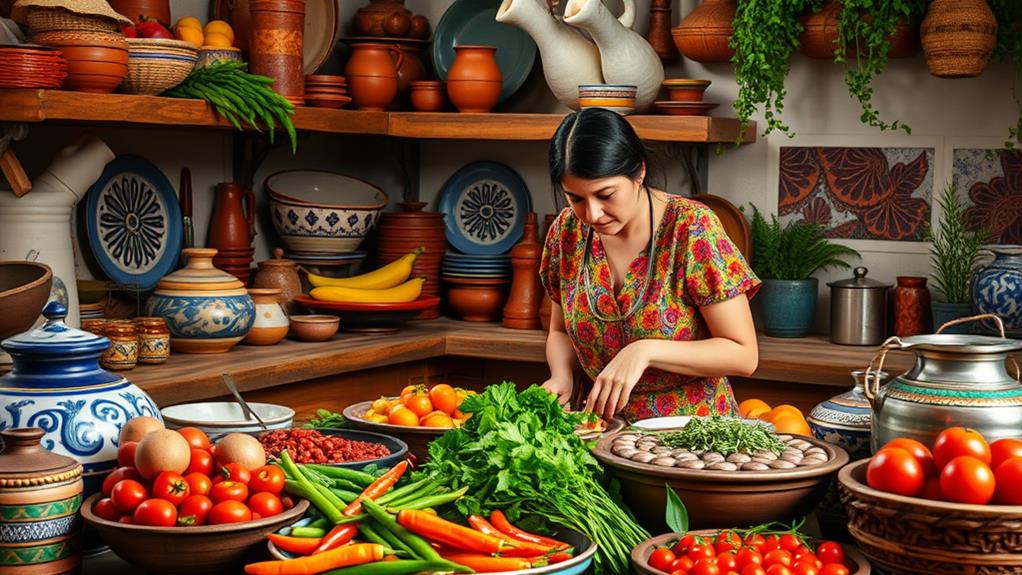
"Like Water for Chocolate" offers a profound exploration of Mexican cultural traditions, especially in how it portrays familial obligations and gender roles. Through Tita's journey, you witness the struggles women face in a deeply patriarchal society, where societal expectations often stifle their autonomy.
The novel serves as a cultural metaphor, using food to represent emotional expression and connection among family members. Each recipe is steeped in tradition, illustrating how culinary practices are intertwined with identity and heritage. This resonates with themes of hope and perseverance found in narratives like that of Louis Zamperini, where personal struggles reflect broader societal issues.
The incorporation of magical realism enhances the narrative, blending everyday life with fantastical elements that reinforce the importance of maintaining traditions. Tita's fight against the constraints imposed upon her exemplifies the broader struggle for autonomy that many women encounter.
As you read, you can't help but reflect on the rich heritage of Mexican culture, which is both celebrated and critiqued through Tita's experiences. The novel invites you to contemplate how these cultural traditions shape individual identity while maintaining a connection to family and community.
Ultimately, "Like Water for Chocolate" is a poignant commentary on the complexities of love, duty, and the quest for self-understanding within the framework of Mexican traditions.
Critical Reception
With its global best-seller status and an impressive average rating of 3.95 out of 5 from over 371,000 readers, "Like Water for Chocolate" has firmly secured its place in literary history.
The critical reception of this novel showcases a blend of admiration and critique, particularly regarding its unique approach to storytelling and character dynamics. The themes of resilience and personal growth resonate deeply with readers, inviting them to reflect on their own journeys of self-discovery and empowerment, much like the narratives found in healthy reads that promote overcoming challenges.
- Readers often praise the emotive imagery and vivid characterization, which bring the culinary arts to life.
- The magical realism enhances the emotional depth of Tita's journey, making it more relatable and poignant.
- However, the romantic plot, especially the love triangle involving Tita, Pedro, and John, divides opinions; some favor John as a more compelling figure.
- Despite some readers noting abrupt tonal shifts and weaker characterization as drawbacks, the overall charm of the narrative prevails.
The best-seller phenomenon surrounding "Like Water for Chocolate" is a reflection of its enthralling blend of flavors, emotions, and cultural significance.
This fusion of elements creates a rich tapestry that invites readers to savor every page, making it a memorable literary experience.
Author Laura Esquivel
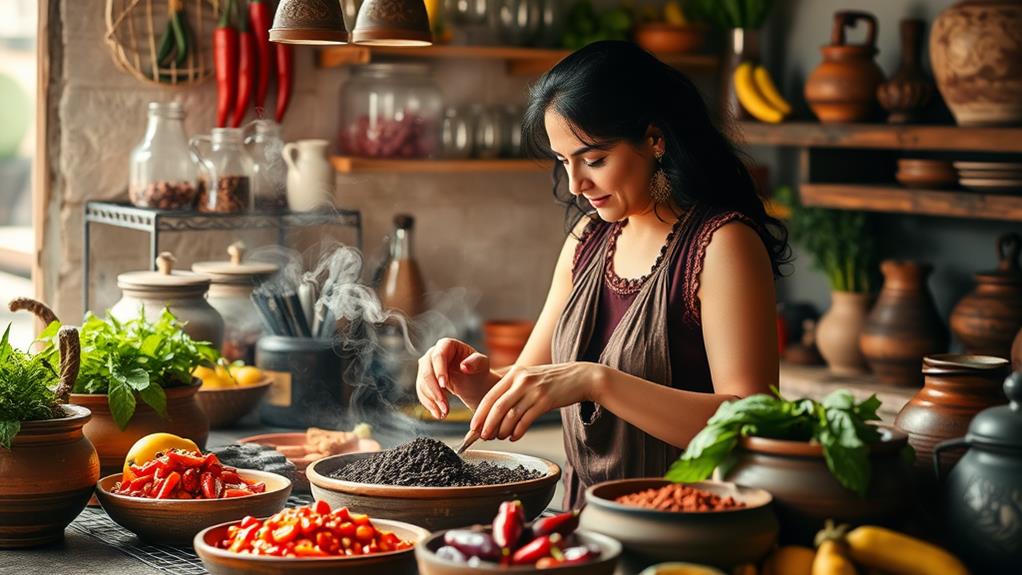
Known for her enchanting storytelling, Laura Esquivel has carved a niche in contemporary literature that intertwines personal experience with rich cultural narratives. Her debut novel, *Like Water for Chocolate*, became a bestseller, engaging readers with its unique blend of magical realism and recipes.
You'll find that Esquivel's narrative style immerses you in the sensory richness of Mexican culture, where food becomes a powerful metaphor for love and emotional expression. This emphasis on emotional connections mirrors themes found in works like *The Immortal Life of Henrietta Lacks*, which highlight the complexities of personal relationships and the impact of cultural backgrounds on individual experiences the importance of informed consent.
Esquivel explores family dynamics and the complexities of love, drawing you into the lives of her characters as they navigate their relationships. Her works often emphasize emotional growth and self-understanding, reflecting her teaching philosophy that prioritizes personal insight over conventional education.
In addition to *Like Water for Chocolate*, she's penned notable titles like *The Law of Love*, which investigates deeper into themes of love and identity while incorporating multimedia elements.
Through her storytelling, Laura Esquivel not only entertains but also invites you to reflect on your own life experiences, creating a lasting impact that resonates well beyond the pages of her novels. Her contributions continue to shape contemporary literature, celebrating the richness of Mexican culture and the human experience.
Ratings and Reviews
Readers have generally embraced *Like Water for Chocolate*, reflected in its impressive average rating of 3.95 out of 5 from over 371,000 ratings. With a total of 14,129 reviews, the feedback showcases a range of emotions and perspectives.
You'll find that:
- Many praise the *emotional depth* of Tita's journey, which resonates with the benefits of reading, as it can enhance mood and cognitive function, setting a positive tone for the day morning reading benefits.
- Some readers express frustration with certain *characters* and their *plot dynamics*.
- The novel's *cultural impact* is undeniable, intertwining *love and tradition* in a unique narrative.
- Overall, it's considered an *engaging experience* through its *culinary storytelling*.
While opinions vary, it's clear that *Like Water for Chocolate* resonates with many. The rich storytelling evokes personal reflections, allowing readers to connect their emotions to Tita's experiences.
This blend of culinary art and heartfelt moments makes it a significant piece of literature. Whether you're captivated by the romance or intrigued by the cultural themes, the ratings and reviews reflect a book that's sparked conversations and left a lasting impression.
Community Insights
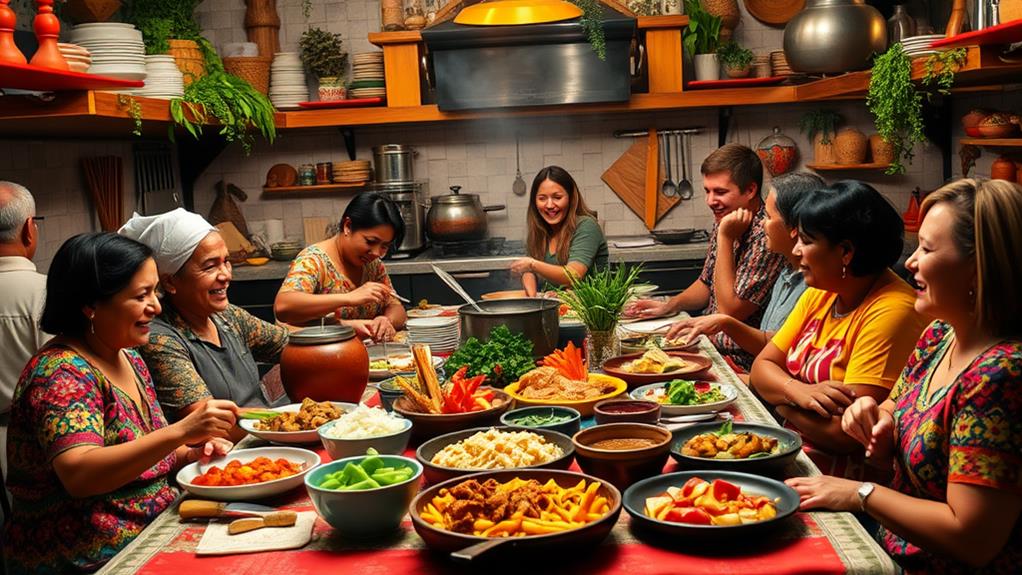
Community insights reveal a tapestry of perspectives surrounding *Like Water for Chocolate*, as many relate their personal experiences to Tita's emotional journey and her struggles with family tradition. Readers often connect with Tita's challenges, reflecting on how love and food intertwine in their own lives.
The novel sparks conversations about traditional gender roles and family dynamics within Mexican culture, illuminating the tension between societal expectations and personal desires. In a similar vein, the exploration of resilience in *The Book Thief* highlights how characters navigate oppressive circumstances, showcasing the strength found in both love and defiance against societal norms the power of resilience.
Food emerges as a pivotal motif, symbolizing the passion and conflict that define Tita's life. Many community members appreciate how culinary elements deepen the emotional resonance of the narrative. Some express admiration for the enchanting qualities of the story, while others voice frustration with certain character dynamics or plot developments.
Ultimately, the book's legacy continues to fuel discussions on love, tradition, and the transformative power of food in storytelling. It serves as a touchstone for those exploring the complexities of family ties and cultural expectations.
Whether through shared recipes or emotional reflections, the community's insights showcase how Tita's journey resonates far beyond the pages, connecting individuals across generations and backgrounds.
Conclusion
To sum up, "Like Water for Chocolate" immerses you in a sensory journey that intertwines food, love, and tradition. Did you know that it has sold over four million copies worldwide since its release? This enthralling tale not only showcases Laura Esquivel's unique storytelling but also highlights the profound impact of cultural heritage on personal identity. As you turn the pages, you'll find yourself craving more than just the delicious recipes—it's a feast for the soul.

